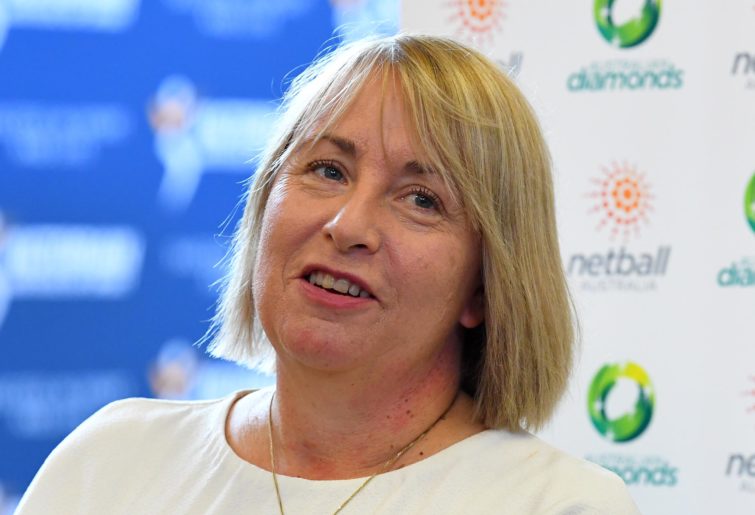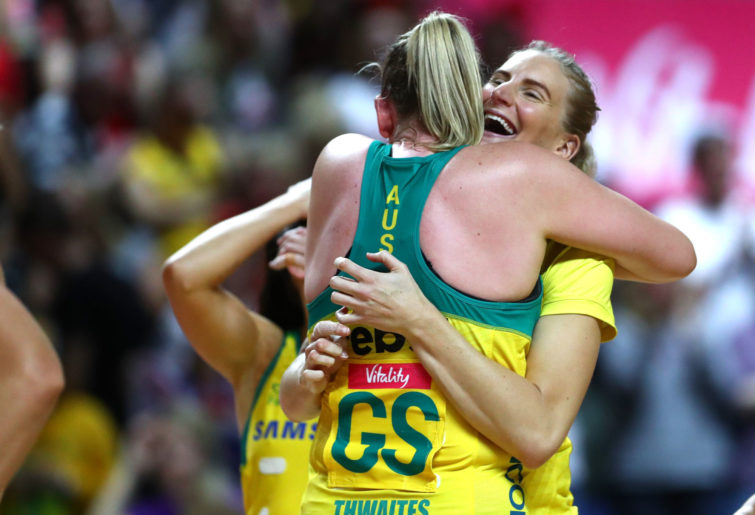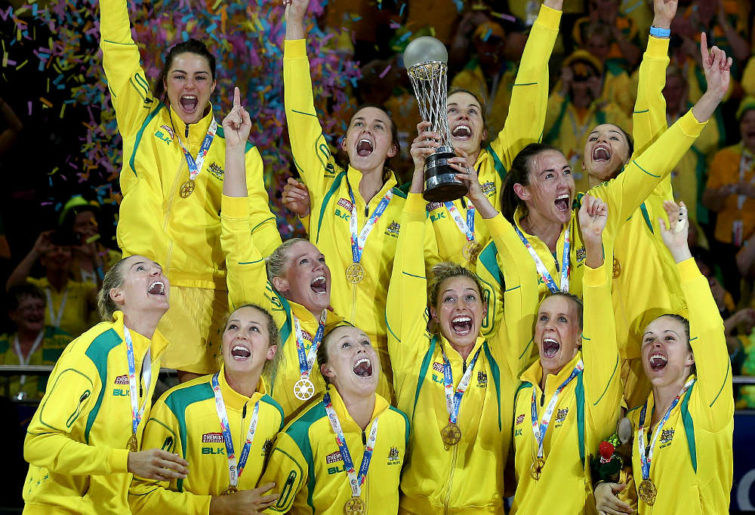New Zealand goal denied as both umpires don't see it, but Diamonds too strong in Quad Series final
Australia's Diamonds have underlined their global netball supremacy
Opinion
Netball Australia hasn’t been backwards in making their move.
The short-notice and largely unexpected departure of Lisa Alexander from the head coach role of the national team signals an intent by Netball Australia to position the Diamonds in the best possible place ahead of the next cycle of headline international competitions: the 2022 Commonwealth Games and the 2023 Netball World Cup.
Looking across at netball from the head coach bunker of various other professional sports, Alexander’s forced departure might seem strange given her record. In August 2011 she inherited from Norma Plummer a team ranked No. 1 in the world and maintained the No. 1 ranking throughout her nine-year tenure by achieving an 83-19 win-loss record over 102 international games. Against the New Zealand Silver Ferns powerhouse she maintained a 72 per cent win rate.
In many professional sports a coach with a record like that would be one small step short of being deified! Not so in netball – at least not in Australia.
Two crucial one-goal losses – to England’s Roses in the 2018 Commonwealth Games gold medal match and to New Zealand’s Silver Ferns in the 2019 Netball World Cup final – are, according to Netball Australia, two nails large enough to seal shut the lid on the coffin of Alexander’s career as head coach of the Diamonds.
As yet there hasn’t been an announcement as to who will be Alexander’s replacement, but there has been plenty of speculation, including around the desirability or not of maintaining the policy that the Diamonds coach can’t do double duty as a coach in club-level competition – in other words, in Suncorp Super Netball, which has rapidly evolved in its short three-year history to be the best national-level competition in the world.
That needs to be questioned as a policy if for no other reason than Kiwi Noelene Taura’s successful efforts of taking a newly created team, the Sunshine Coast Lightning, to back-to-back SSN championships in 2017-18 and then backing up with them to a third successive grand final appearance in 2019, having been made head coach of the Silver Ferns in the meantime. Taura took up the Silver Ferns cudgels following their incredibly poor (by their standards) performance in the 2018 Commonwealth Games, where they came fourth, and successfully turned them around into the 2019 Netball World Cup gold medal-winning outfit that delivered when it mattered.
Not only has Noelene Taura demonstrated that SSN and national team coaching be combined successfully, but it could also be argued that being in the SSN cauldron is almost a prerequisite to a coach being able to maintain the ‘coaching match fitness’ they need to be able to deliver at a national level. And Noeline Taura is now Dame Noeline Taura – not quite deification, but getting closer!

(AAP Image/James Ross)
The implication in Alexander’s axing is that Netball Australia think there is an opportunity to do better, to improve on Alexander’s very solid record. But there have to be some questions around the veracity of that implication. Indeed it could be argued that the implication is optimistic at best, delusional at worst.
The reality is that the netball landscape in Australia and globally has changed significantly over the nine years of Alexander’s tenure. The rules that applied then really don’t apply now. It’s arguable that during the last decade at a global level netball has changed and evolved more than it did in the previous 65 years of the post-war era.
The Australian contribution to that evolution shouldn’t be underestimated, with Australian coaches and players with experience in Australia’s domestic competitions taking their knowledge and skills and applying them in overseas competitions, contributing significantly to the improved standard of international competitors.
If ten or 15 years ago you had said to the parents of the majority of today’s SSN players that their daughter will grow up to be a professional netballer and make a (modest) living out of the sport, they would probably have looked at you as though you were deranged. But that’s the reality of today.
Professionalism, when it comes to many sports, often comes quickly and invariably brings with it seismic change that isn’t always welcomed in all quarters.

(Chloe Knott – Danehouse/Getty Images)
Historically, netball in Australia and throughout the world has been an amateur sport run by and large by an amateur administration and populated by athletes who at the very top level are driven by a love and passion for the sport.
Significant ongoing practical and financial support from family and friends as well as huge sacrifice on behalf of the athletes has seen the evolution of international-level competition characterised by the Netball World Cup (commenced in 1963) and Commonwealth Games (1998) tournaments that have traditionally been dominated by Australia and our Kiwi brethren. For many, many years all the other nations (predominately Commonwealth nations) where netball has been played have been viewed by Australia and New Zealand as being there to make up the numbers.
That’s changed and continues changing. Rapidly. Remember, the first nail in Lisa’s coffin wasn’t a one-goal loss to New Zealand, it was a one-goal loss to the English Roses. The Kiwis had already exited stage left in that competition, much to their surprise.
Prior to the advent of SSN the headline local netball competition was the ANZ Championship, played by teams from Australia and New Zealand from 2008 to 2016. The format varied slightly over the years, but one particular policy very much shaped not only the competition but the development of the sport on both sides of the Tasman was the cap on the number of imports allowed to be included in a team’s roster.
While the ANZ era saw some of the very best non-Australian or New Zealand players fill the limited spots available, it was for all intents and purposes a closed shop with an overwhelming preference given to Australians and New Zealanders.

(AP Photo/Rob Griffith)
Given the essentially amateur nature of the sport and the historical strength within Australia and New Zealand relative to all other netball nations the ANZ Championship – and the Australia-only Commonwealth Bank Trophy competition before it – it seemed to be as much a training or trialling ground for current and prospective Diamonds as it was a serious national competition in its own right. The result was a wide and deep vein of talent covering all positions for Diamonds selectors to choose from in the knowledge that when push came to shove they would most likely be going up against the New Zealanders in all the games that mattered.
Then along came SSN. Every aspect of the elite-level game changed, virtually overnight. Media rights deals that had real money behind them and a much wider broadcast profile than they had ever experienced before. Social media obligations and more intense expectation and scrutiny from sponsors and fans. Players being paid and treated as full-time professionals for the first time ever, anywhere in the world. And no cap on imports.
This last piece wasn’t universally supported, but it’s a bit hard for a sport seeking to develop a truly professional-level domestic competition that is “the best in the world” to be taken seriously if it artificially excludes the majority of the world’s elite-level players via an arbitrary quota system.
After three successful years many of the aims of the SSN experiment have been achieved – viewership has grown significantly, as have attendances at games and grassroots interest, with the overall profile of the game improving domestically and internationally.
SSN and the arrival of the internationals has ramped up the level of competition among elite-level players for court time to the extent that quite a number of the Australian contracted players and training partners are spending more time warming the bench rather than racking up time on the court, leading to frustration and ongoing calls to return to the ‘good old days’ of caps on the number of imports.
SSN has changed the dynamic. It isn’t there as a training and trialling ground for prospective selection to national teams; SSN is an entertainment and marketing enterprise in and of itself. It just so happens that in doing that successfully it has become a world-class showcase for the best players in the world. In the long term, if you are good enough, you will get a gig, but SSN has made that a lot harder. The bar has been raised.
For Australian players that has some consequences, and at an individual level not all of them good. Some players who would have got significant court time in the ANZ Championship days aren’t getting it now. Some will stick it out, possibly always just being in the squad rather than being in the team, particularly the default starting team. Some will get frustrated and leave the game entirely. Some will seek to ply their trade offshore in places like NZ, the UK or South Africa.
It can be argued that SSN also has some consequences for the Diamonds talent pipeline. Visibility of up and coming new Australian talent has been reduced. There just aren’t as many Australian players getting court time. The opportunity for new Australian talent to evolve, develop and grow at the highest level has been reduced.
The capacity to develop the wide and deep roster of troops that is needed to succeed in World Cup or Commonwealth Games tournaments has been curtailed, but given the increasingly intense nature of these tournaments and the ever-present threat of injury, the need to have the flexibility of a plan B, C, D and E is paramount – and even in the best of times that has risks attached to it.
When as a coach you have a limited number of tier-one troops or combinations at your disposal you are left very exposed. This is the environment Lisa Alexander’s successors will be stepping into.
It takes a brave coach to constantly roll the dice by seeking to develop their squad in the heat of the battle, but that is really the only chance they get to do it. There’s simply no substitute for in-competition court time to develop and mould players and combinations. NSW Swifts head coach Briony Akle is a case in point, regularly working her roster onto the court – a significant contributor to her achievement of an unexpected SSN championship in the face of a fairly horrendous injury toll throughout the course of the 2019 SSN competition.
You can’t consistently win matches, let alone tournaments, if you run out of troops or effective combinations, but over the long term a reduction in the availability of seasoned players and player combinations is exactly the scenario that will be faced by Lisa Alexander’s successors. And this occurs at the same time that the standard of international netball has risen significantly – and it will continue to rise into the future.
Being an Australian I have a natural bias towards seeing the Diamonds succeed, but, being a netball supporter, I also want to see the standard and popularity of the game continue its trajectory of growth and development at a global level.
Those two desires are no doubt mutually exclusive, and that will most likely mean that the 81 per cent win rate that the Diamonds have managed over the last decade under Lisa Alexander’s stewardship won’t be replicated over the next decade.
I’m okay with that. I’d rather see the Diamonds achieve a 60-ish per cent win rate where every game consisted of a 60-minute running battle against a truly world-class opponent, where the result wasn’t certain until the dying moments and where the likely participants in the gold medal matches of World Cup and Commonwealth Games tournaments weren’t known with a high degree of certainty before the tournament had even started. Having said that, if the win rate gets down towards 50 per cent, then clearly something must be done!
The bottom line here is that if Netball Australia think that Lisa Alexander’s successors – and yes, I purposely use the plural – will improve on her 81 per cent win rate, they are deluded. Her successors will be doing well to get anywhere near that over the long term, and while a win at World Cup or Commonwealth Games level may balance out a raft of losses at a lower level of competition, the reality is that the overall win rate is a great predictor of success at World Cup and Commonwealth Games level.
My final words here are in the form of a message to Lisa Alexander. Lisa, if you are reading this, mark down September 2028 in your calendar. By that time you will have been out of the Diamonds head coach role for as long as you were in it and there will have been two cycles of Commonwealth Games and World Cup competitions. Have a look at the win rate of the Diamonds since your departure and hold your head high – it can as near as possible be guaranteed that it won’t have exceeded the tremendous benchmark you set in your time at the helm. Smile and know that in the annals of Diamonds history the Alexander era was as good as it gets.